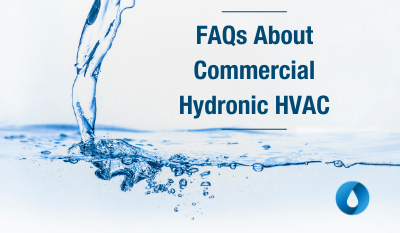Commercial hydronic HVAC can be complicated. There are so many different types of hydronic equipment, and with new technologies and innovative products emerging regularly. You may even ask yourself, “How does hydronic HVAC even work?” or “What hydronic HVAC system is best for my building?” One way or another, we have all had to ask ourselves these questions. Luckily, we have all (or at least some) of the answers you may have about hydronic HVAC systems.
Here are a few FAQs about commercial hydronic HVAC:
What is hydronic HVAC?
A hydronic HVAC system utilizes water as the primary fluid to transfer energy throughout the building. Water has outstanding heat transfer characteristics, along with other benefits (i.e. – plentiful, non-toxic, “green," inexpensive) that make it ideal for this purpose.
How does hydronic HVAC work?
To deliver heat, the system must have a heat source, such as a boiler, and to provide cooling, the system must have a cooling source, such as a chiller or cooling tower. The heated or cooled water is pumped throughout the building to air handling units or terminal units (or other similar), where it transfers energy with air from the ventilation system before it recirculates to the heating or cooling source. The conditioned air is then delivered to the room.
What are the different variations of hydronic HVAC systems?
There are many different types of hydronic HVAC systems, including: geothermal heating systems, radiant heating, radiant cooling, fan-coil, VAV, single-pipe, two-pipe, three-pipe, four-pipe, and series loop.
Can installing a commercial hydronic HVAC system save you money?
The simple answer? Absolutely. Hydronic systems circulate temperature-controlled water through pipes to heat and cool spaces. Because water is a better heat transfer medium than air, hydronic heating can be a
.png?width=229&name=Add%20a%20heading%20(13).png)
more energy efficient heating system. And when you save energy, you save money.
How long do hydronic HVAC systems typically last?
With the proper preventative maintenance, hydronic equipment can last up to 20-25 years before needing to be replaced. While hydronic systems may be more expensive up front than traditional air systems, their long-term reliability will save you money in terms of building life cycle costs, repair, maintenance, and re-installation costs.
What is the best hydronic HVAC system for my building?
Every commercial project is different, with different spaces, different specifications, and different end goals. To figure out the best commercial hydronic HVAC system for your building, please reach out to your local HTS team member! Our team is equipped with experienced industry experts that will talk you through the best hydronic HVAC system for your space that may help you save time and save money.
For any additional questions about hydronic HVAC systems, please reach out to your local HTS salesperson!

.png)


.png?height=100&name=HTS_Symbol_RGB%20(2).png)



Submit a Comment